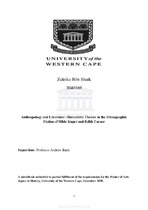Anthropology and literature: Humanistic themes in the ethnographic fiction of Hilda Kuper and Edith Turner
Abstract
This mini-thesis makes an argument for the significance of a female-dominated hidden tradition of experimental ethnographic writing in British social anthropology. It argues that the women anthropologists who experimented with creative forms of ethnography were doubly marginalised: first as women in an androcentric male canon in British social anthropology and American cultural anthropology, and second as creative writers whose work has been consistently undervalued in sombre scholarly circles. The study proposes that Hilda Beemer Kuper (1911-1995) and Edith Turner (1921-2016) should be regarded as significant in a still unexcavated literary tradition or subgenre with Anglo-American anthropology. It showcases the narrative craft of Kuper through a detailed textual analysis of her two most accomplished experimental ethnographies A Witch in My Heart (written in 1954, performed in 1955, and published in siSwati in 1962 and English in London in 1970) and A Bite of Hunger (written in 1958 and published in America in 1965). I highlight Kuper‟s multiple literary techniques in evoking of the fraught position of young Swazi co-wives, modern women and women accused of witchcraft in a patriarchal culture with particular attention to her gifts in creating dramatic plots, complex characters and dialogue rich in vernacular metaphor and proverbs. It then celebrates the even more experimental creative writing of Edith Turner. While Turner has sometimes been acknowledged for her hidden contributions to the co-production of her deeply loved and more famous husband Victor, she has not been given her due as an experimental ethnographer, also placing the experiences of African women centre-stage. In what she overtly advertised as “female literary style”, Turner‟s belatedly published 1987 novel The Spirit and the Drum. A Memoir of Africa is analysed with meticulous attention to the literary techniques by which she seeks to explore an anthropology of experience and empathy. These accomplished but under-acknowledged women creative writers sought to explore what they both explicitly conceived of as gestures of humanist cross-cultural engagement.

